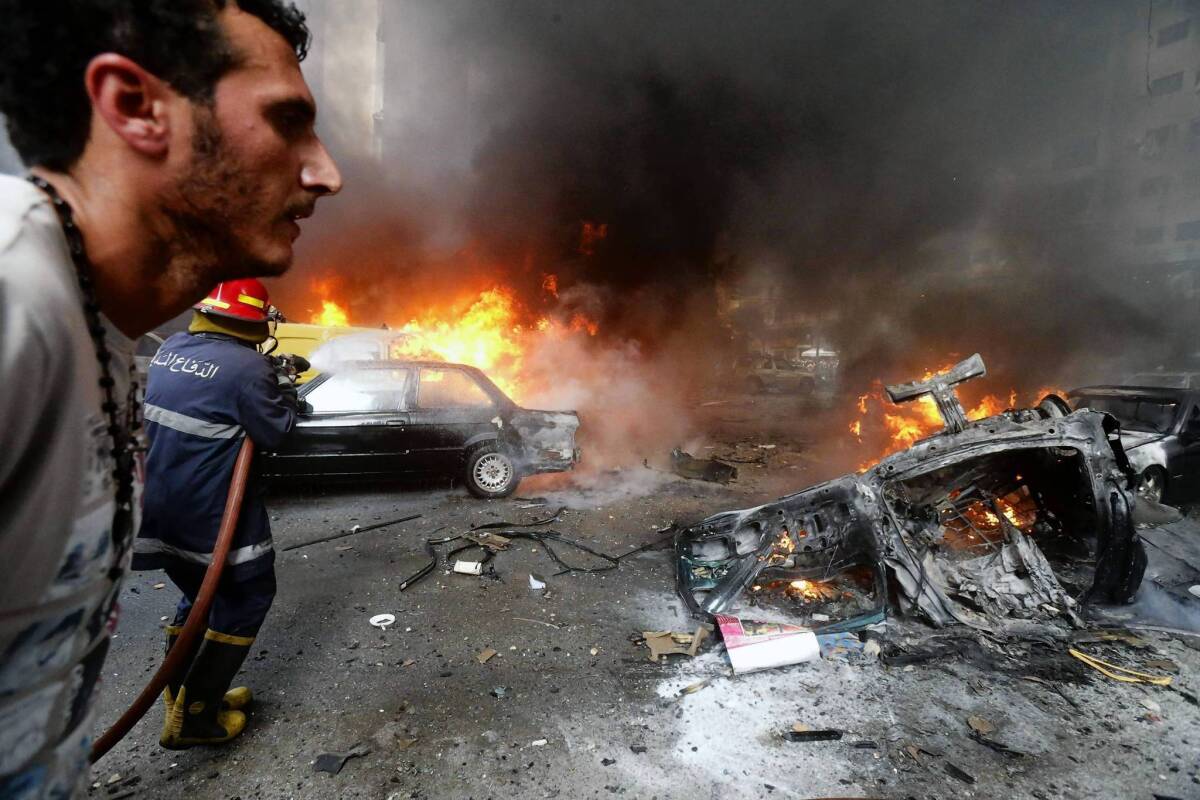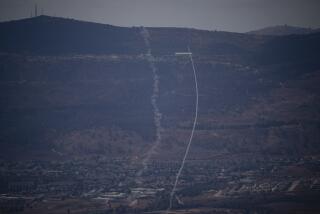Lebanon car bomb renews fears of spillover violence from Syria

BEIRUT — A car bomb that injured dozens Tuesday in the urban heartland of the Hezbollah movement renewed fears that the sectarian-fueled strife in Syria was migrating into neighboring Lebanon.
Officials from various political movements and religious groups denounced the attack — which occurred as residents were preparing for the start of Ramadan, a Muslim month of fasting — as an effort to sow discord in Lebanon. A fragile peace has held for almost a quarter of a century, since the end of the Lebanese civil war in 1990. Authorities vowed what they termed a provocation would not succeed in inflaming communal conflict.
“What they’re trying to do is create a sectarian division between the Sunni and Shiite,” Interior Minister Marwan Charbel told reporters at the scene. “I can assure you that neither Sunnis or Shiite will be dragged into it, no matter what happens.”
The blast occurred in a mostly Shiite neighborhood in south Beirut that is a stronghold of the Hezbollah movement, a major political and paramilitary force here.
No one took responsibility for the strike, but suspicions immediately fell on Sunni militants enraged at Hezbollah’s decision to intervene in the Syrian civil war on the side of President Bashar Assad. Mostly Sunni rebels are fighting to oust Assad’s government, and some have threatened to take their battle to Hezbollah’s Lebanese homeland.
In April, one Syrian rebel group, Al Qaeda-affiliated Nusra Front, warned that Beirut would be set ablaze if Hezbollah did not withdraw its forces from Syria.
Publicly, Hezbollah officials and their allies seemed intent Tuesday on easing the incendiary sectarian tensions. They tended to blame Hezbollah’s traditional enemies, Israel and the United States, for the bombing.
A Hezbollah lawmaker, Ali Ammar, told reporters at the blast scene that the group was being targeted because of its “resistance” to Israeli and U.S. aims in the region.
Tuesday’s blast in the bustling Beir al Abed district injured 53 people, most of whom suffered minor wounds, authorities said. No one was reported killed, though the bomb caused extensive damage, setting more than a dozen cars ablaze in the parking lot where it detonated and blowing out windows in nearby apartment buildings and storefronts. Authorities described the bomb as relatively small, containing less than 100 pounds of explosive material.
President Michel Suleiman, a Christian, warned against Lebanon returning to the “dark stages,” a reference to sectarian violence during the 15-year civil war, which left large swaths of the country in ruins. The specter of a possible reprise of that bleak chapter in Lebanese history haunts many here.
Spillover violence from the Syrian civil war has been on the rise in Lebanon, which is also home to more than 500,000 Syrian refugees. Many officials and observers have voiced fears that the Syrian chaos could destabilize Lebanon, upsetting the nation’s delicate democratic balance. In recent weeks, a steady stream of political leaders have called for calm and have warned against sectarian bloodletting.
Lebanon’s government remains in a tenuous state. Legislators were unable to reach agreement on a new election law, forcing the postponement of parliamentary balloting that had been scheduled for last month and leaving a caretaker government in charge.
Tuesday’s explosion appears to be the second attack in recent months targeting Hezbollah strongholds in the southern expanses of the capital. In May, a pair of rockets landed in another Hezbollah residential bastion in south Beirut, injuring several workers.
But Syria-related violence has flared throughout the nation, not just in the capital.
Scores have been killed in periodic gun battles in the northern city of Tripoli pitting anti-Assad factions against Assad loyalists residing in a crowded hilltop neighborhood known as Jabal Mohsen.
And last month, 18 Lebanese soldiers were among dozens of people killed near the southern city of Sidon when the Lebanese military clashed with armed devotees of a hard-line Sunni preacher who has backed the rebel cause in Syria.
The preacher, Ahmad Assir, and his followers are vehemently opposed to Hezbollah’s intervention in Syria. The preacher escaped the battle along with many of his armed acolytes and remains at large, authorities said.
Bulos is a special correspondent.
More to Read
Sign up for Essential California
The most important California stories and recommendations in your inbox every morning.
You may occasionally receive promotional content from the Los Angeles Times.











